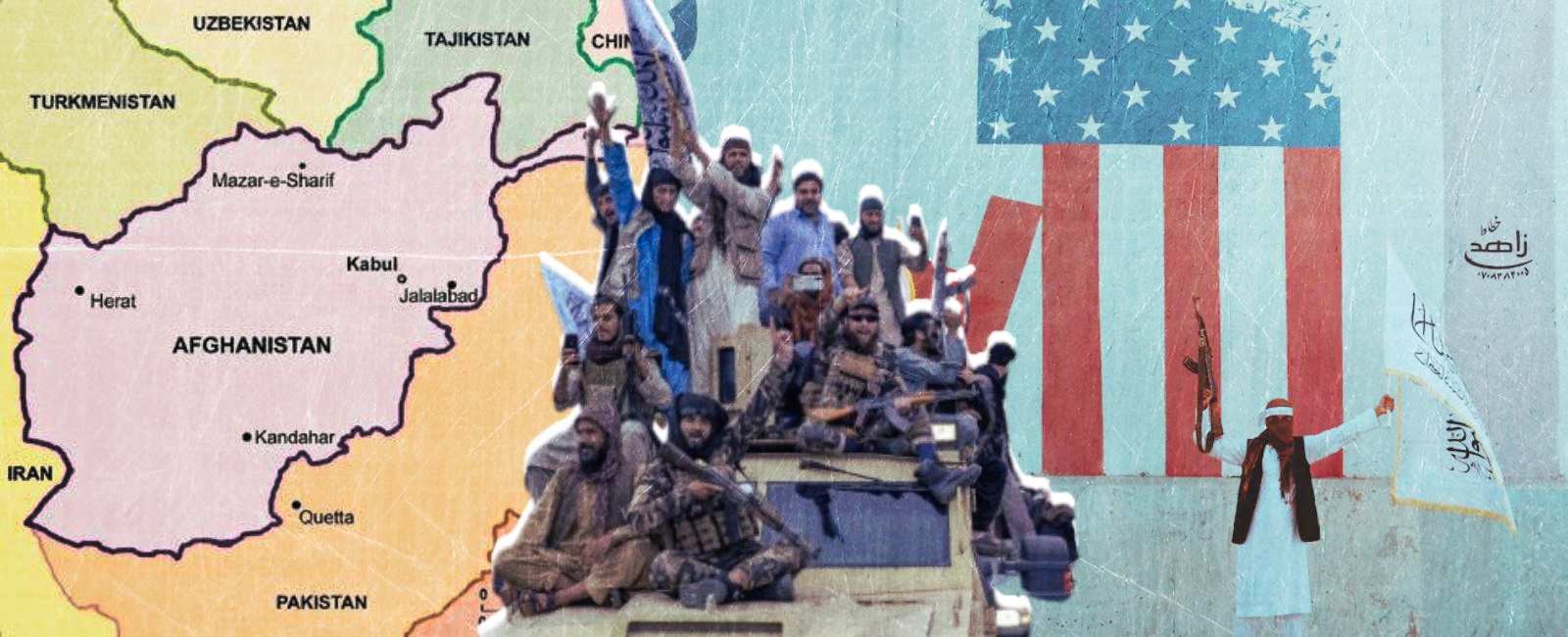Is Afghanistan really the 'graveyard of empires'?
Geo.tv speaks with international analysts to understand if the label is significant or mere national rhetoric

"The courage of Afghans should not be tested. If someone wants to do this, they should ask the Soviet Union, America, and Nato, so that they can explain that it is not good to play games with Afghanistan."
Afghanistan Foreign Minister Amir Khan Muttaqi issued this hollow warning to Pakistan during a weeklong and rare visit to India when the hostilities began, which were finally ceased by a fragile ceasefire agreement in Qatar on October 19.
Following Muttaqi's mealy-mouthed warning, social media erupted with the old line that "Afghanistan is the graveyard of empires." The term, once limited to popular books and mass media, has even penetrated scholarly circles.
Before debating if this phrase — a land where global powers come to get buried — belongs to legend or reality, let's begin with the moment it all started.
After US-led forces got tired of dying in action and Washington started feeling the economic burn, they pulled out of Afghanistan in 2021, allowing the hardline Afghan Taliban to take power. As soon as that happened, Pakistan, already fighting an intense war on terror, saw a sudden spike in attacks.
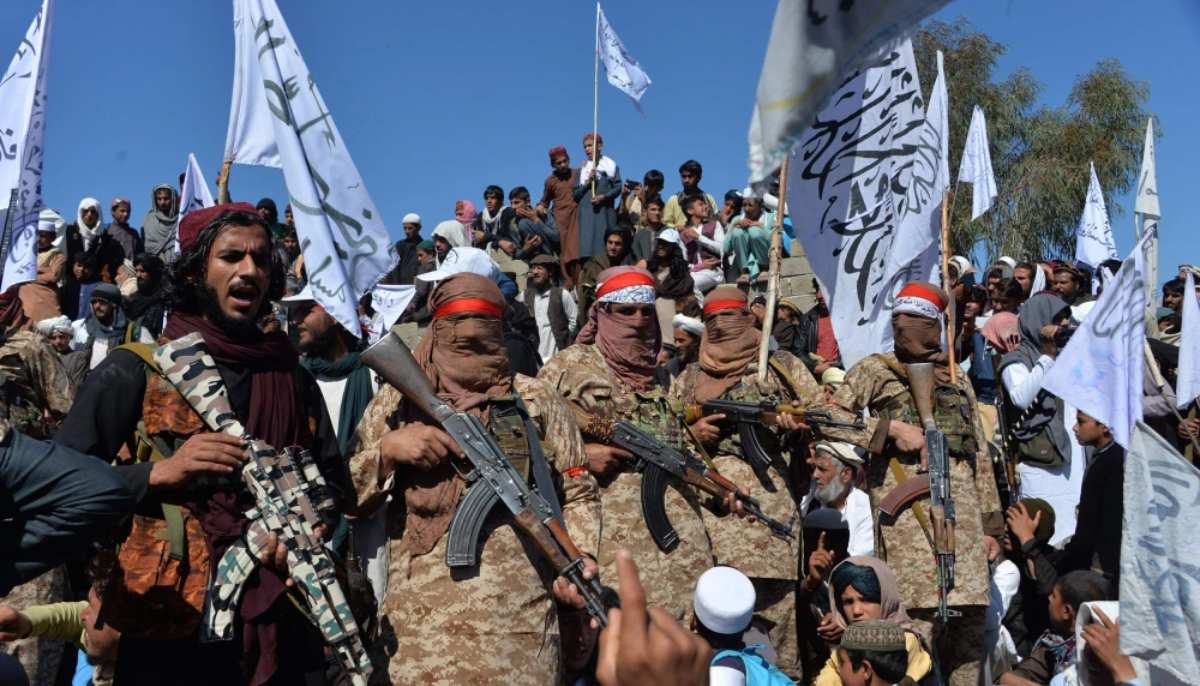
Afghanistan has always remained a hub, or what we can easily call a safe haven, for terrorists. Whether it is Al-Qaeda, Tehreek-e-Taliban Pakistan (TTP) — also referred to as Fitna-al-Khawarij nowadays, central Asian terror groups or Daesh, which are not aligned with them, all are present in this country.
Time and again, the government of Pakistan and even the international community have urged the Taliban regime to act against such terror groups and prevent them from using Afghan soil against other countries. However, the interim regime did not heed these requests.
The two countries share a roughly 2,500-kilometre porous border with several crossing points. Those routes aren’t just lines on a map; they’re central to local trade and to the everyday ties between people on both sides.
On the night of October 9, 2025, loud explosions shook Kabul. The Taliban claimed Pakistan carried out airstrikes. Pakistan neither confirmed nor denied the claim. Everyone just watched.
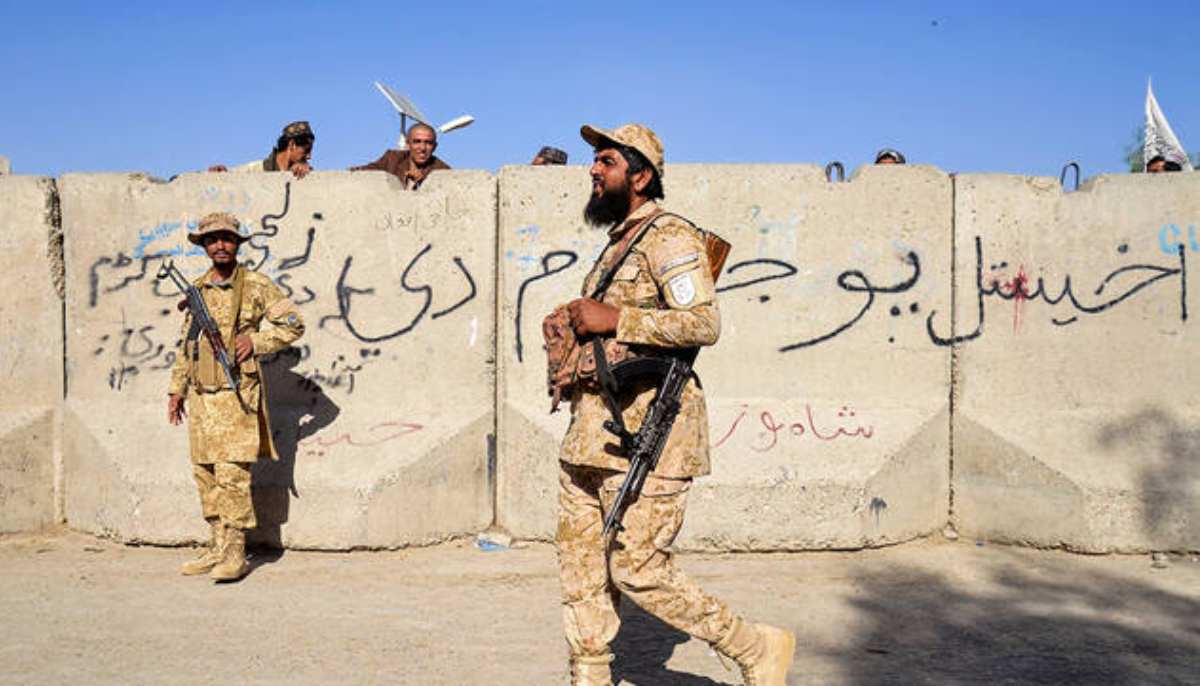
Two days later, Afghan troops opened fire on Pakistani border posts. Pakistan fired back, using guns and artillery, and shared video showing hits on Afghan positions. By the next day, the shooting stopped. A fragile truce, brokered by Turkiye and Qatar, was finally held — at least for a little while.
After that, both sides tried peace talks. They called them peace talks, but nothing came of it. The Taliban showed they weren’t willing or able to act against terror groups. Pakistan stuck to its demands. In the end, the talks collapsed. But the saving grace is that the ceasefire is still holding — a relief for the common people.
Geo.tv spoke to international analysts to understand whether the label has significance or is it mere national rhetoric.
Historical references
The most common examples given to support Afghanistan being "the graveyard of empires" are the Soviet Union and the withdrawal of US-led coalition forces.
When the British Empire fought the Emirate of Kabul during the first Anglo-Afghan war of 1839, the main British-Indian force was almost wiped out as it withdrew from Kabul in 1842.
Over the next 80 years, the British made two more failed attempts to gain control of this strategically important landlocked country known as the heart of Asia. Later, the Soviet Union was driven out by the Mujahideen in 1989 during the 10-year Soviet-Afghan war.
As Afghan journalist Sami Yousafzai noted, “Throughout history — from British and Russian invasions to the recent US intervention — foreign powers have found it easy to enter the country but extremely difficult to withdraw.”
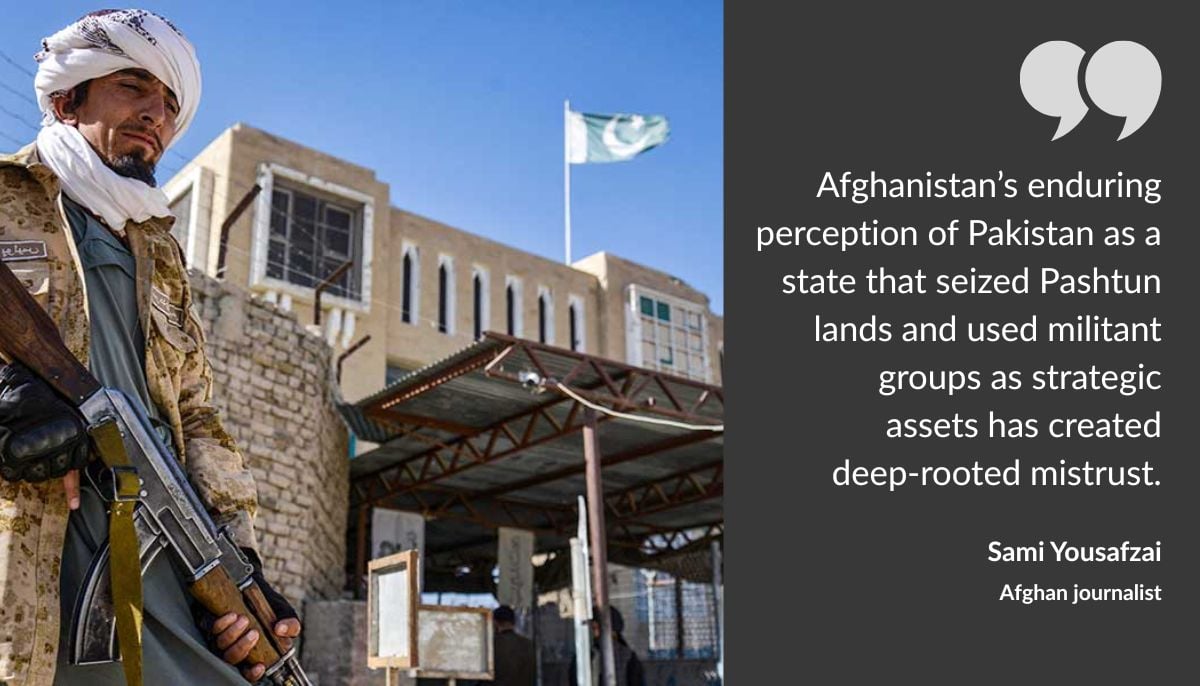
Michael Kugelman, director of the South Asia Institute at the Wilson Centre in Washington, said: "The historical record does show that foreign occupying forces rarely have done well in Afghanistan.
"And when you have foreign empires and you have large powers come in and try to intervene and achieve their goals, they oftentimes fail.”
Following the September 11 terrorist attacks in 2001, the US launched an invasion of Afghanistan to go after the mastermind, Osama bin Laden, harboured by the Taliban. The Taliban were defeated within 60 days, but it took another ten years to find bin Laden, who was finally killed in 2011.
It should have ended there. But for the next decade, a combination of US and British forces stayed in Afghanistan. The goal was always ambiguous. Fast forward to August 15 in 2021, and the Taliban retook control of the country.
Governing Afghanistan is tricky because the country’s social setup is really complex and not easy to manage, says Professor Magnus Marsden, Head of the Asia Centre at the University of Sussex, who is a geopolitical expert on South and Central Asia.
'Hilly terrain'
Geographically, Afghanistan is located at the heart of Central Asia. It is the gateway to South Asia. Due to its strategic location, volatile politics, presence of various distinct tribal groups, and abundant natural resources, Afghanistan has always been a victim of imperialistic advances of multiple empires.
Afghanistan is difficult to conquer due to its hilly terrain, but it is even more difficult to govern. Various empires have tried and failed. As a result, Afghanistan got the nickname: the "graveyard of empires".
"Not really knowing the terrain is really important… These were really different types of battle spaces for these countries that were not simply equipped for operating in Afghanistan," said Kugelman.
Marsden said that the country’s difficult terrain, combined with its complex social structures and highlands, has frustrated imperial ambitions. Military strength alone cannot overcome the realities of the mountains and valleys, where local knowledge proves decisive, he added.
Why everyone failed?
Experts agreed that each foreign power faced unique challenges.
Yousafzai said, “The British failed due to political naivety, over-reliance on conventional military tactics, and misreading tribal dynamics; the Soviets failed because of ideological rigidity, reliance on a weak puppet regime, and underestimating guerrilla resistance; and the Americans failed due to overextension, inability to build a legitimate Afghan state, corruption, and a persistent insurgency.”
Kugelman added, "In some of these cases, you have to look at the failures of policy, not just the broader issue of being in a space where you don't know how to operate. Not really knowing the terrain is really important… These were really different types of battle spaces for these countries that were not simply equipped for operating in Afghanistan."
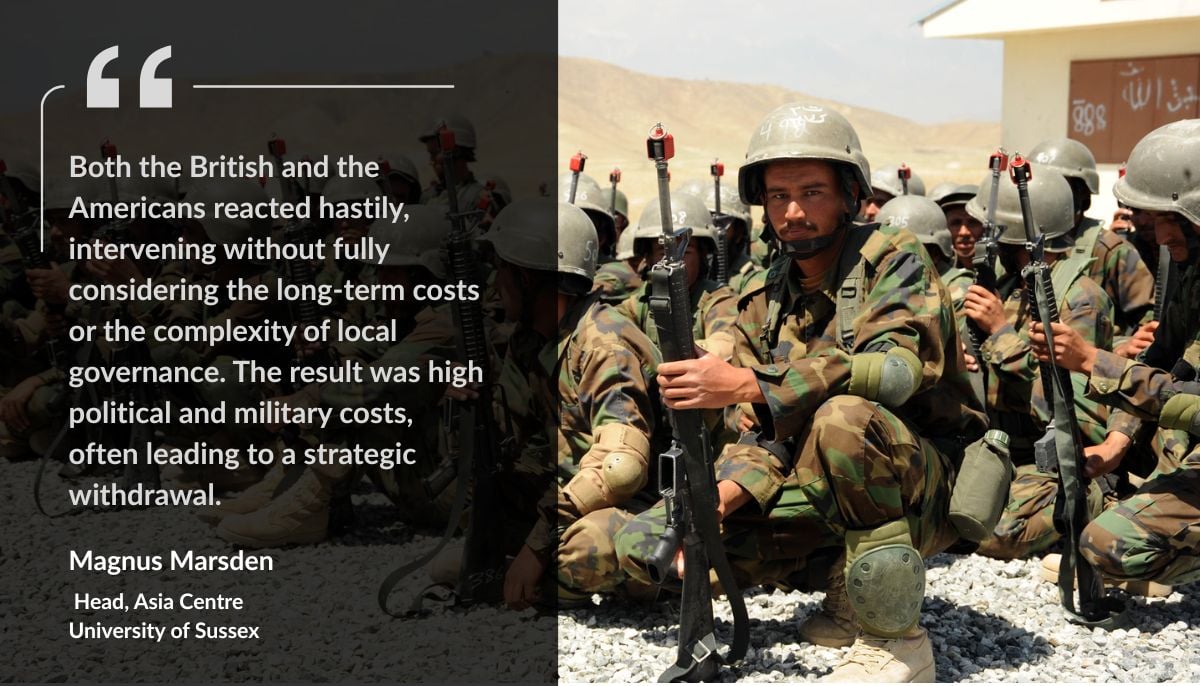
Marsden noted a common pattern of shortsightedness among imperial powers: "Both the British and the Americans reacted hastily, intervening without fully considering the long-term costs or the complexity of local governance. The result was high political and military costs, often leading to a strategic withdrawal."
The Pakistan factor
However, the experts drew a distinction when it comes to Pakistan.
Afghan journalist Yousafzai highlighted historical mistrust, saying, "Afghanistan’s enduring perception of Pakistan as a state that seized Pashtun lands and used militant groups as strategic assets has created deep-rooted mistrust… this issue will persist indefinitely, remaining a constant source of tension and frustration."
On the other hand, Marsden described the relationship as multi-layered, adding, "The Afghan-Pakistani dynamic is complicated by historical, familial, and cultural ties, alongside conflicts and strategic interests. Pakistan’s involvement cannot be understood in the same way as Western interventions, as it combines both neighbourly influence and regional strategy."
'Tool of nationalism'
The label of "graveyard of empires" serves both political and cultural purposes in the modern era. "It reinforces national pride and identity by portraying Afghans as a resilient people who have resisted foreign domination for centuries,” said Yousafzai.
Kugelman emphasised the Taliban’s use of the label, noting, "The graveyard of empires label really can be seen as a tool of nationalism in Afghanistan… It’s also something that the Taliban can leverage because one of the Taliban's core ideological precepts is fundamental opposition to any type of foreign military presence."
Marsden observes that the label is also a rhetorical tool for foreign observers, stating, “Western powers have historically invoked this narrative to explain or justify their own interventions and failures, portraying Afghanistan as inherently resistant rather than critically examining strategic mistakes."
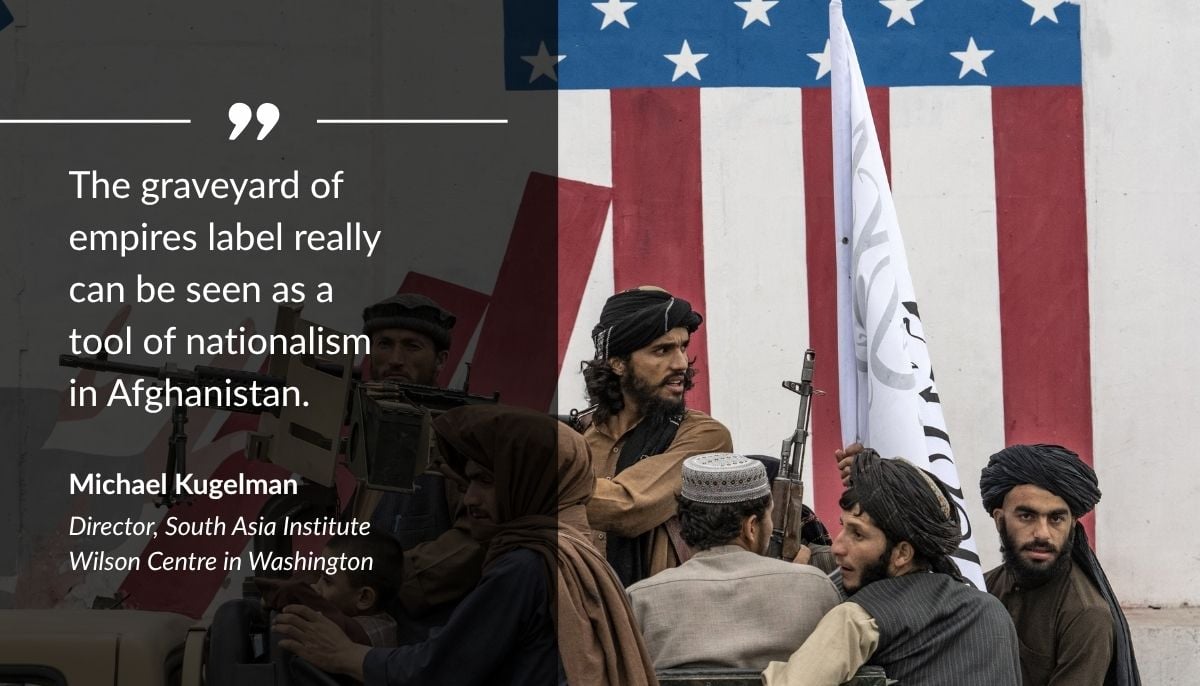
Beyond military considerations, the label carries significant cultural weight. Yousafzai said, “Despite current hardships, its history, pride, and sense of honour remain undeniable… the narrative remains a symbol of honour, resistance, and the enduring spirit of the Afghan nation."
Kugelman added, “The label can generate pride in the country's ability to fend off foreign intrusion and foreign occupation… it serves a useful purpose for the Taliban.”
Marsden says that the narrative is also instrumental for external observers: “For Western powers, the ‘graveyard of empires’ concept has often been used to frame Afghanistan as a naturally resistant state, shifting focus away from the missteps and policy failures that contributed to military setbacks.”
Key to regional stability
The will to conquer is the first condition of victory.
— Ferdinand Foch, French General and Supreme Allied Commander in World War I
Is Afghanistan really the graveyard of empires? The answer is nuanced.
Afghanistan becomes a graveyard only for those who don’t understand its land, politics, and people. Experts say the country’s geography and local dynamics have tripped up foreign powers, but political mistakes and relying too much on standard military tactics have been just as costly.
But when it comes to Pakistan, the situation changes. Islamabad neither wants war nor does it have any intentions to conquer Afghanistan. It has repeatedly expressed its desire for peace and stability in Kabul at every global platform.
"The path to regional peace passes through Afghanistan," Qamar Javed Bajwa, former army chief of Pakistan, was quoted as saying after a Corps Commanders meeting in 2020. And his words carry a deep insight.
In the end, peace in Afghanistan matters for the whole region. Pakistan has shown it can help keep things steady. Even during its recent four-day conflict with India, it acted as a stabilising force, trying to keep the neighbourhood secure and balanced.
Ali Abbas Haidery is a staffer at Geo.tv. He posts on X @aliabbashaidary
Header and thumbnail image by Geo.tv



